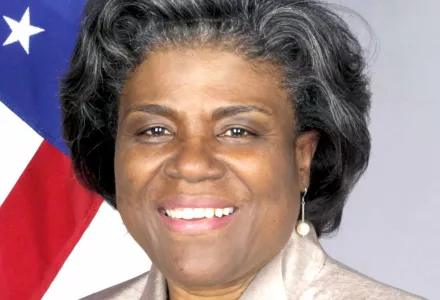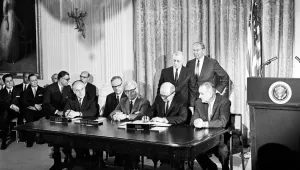“We cannot meet today’s global challenges – on migration, poverty reduction, environment and climate change – without Africa,” Ambassador Linda Thomas-Greenfield said to open her remarks as part of a Future of Diplomacy Project international speaker series event on March 6, 2019.
With a rapidly expanding middle class, a rapidly urbanizing population and a demographic “youth bulge” African countries faced both daunting challenges and significant opportunities, the former US Ambassador to Liberia and former Assistant Secretary of State for African Affairs noted. Between 2017 and 2050, she said, the population of the African continent would double from 1.2 billion to 2.5 billion, representing a quarter of the world’s population.
At the same, a lack of breadth of education and rapid job creation would create challenges for those countries – including Mali and Liberia – with populations with a median age below 20. If rapid progress wasn’t made -- in part with help from the United States -- to put into place clear opportunities for these country’s young people, “migration, radicalization, criminality and trafficking” are the result.
These problems were certain to end up on at the borders and proverbial doorsteps of European countries and the United States.
“Boko Haram is an employment agency,” she said reflecting on the draw the internationally recognized terrorist organization had particularly for young but economically immobile across the continent.
“They wreak havoc on societies with their guns, but often they represent the only opportunity these young people have.”
The United States and its allies needed to continue to invest in preventing the growth of these organizations “out of their own interest,” but with Africa’s future in mind. This would help African leaders “see youth not as a threat, but as an opportunity,” in the long term.
Efforts to boost economic growth
Across Africa, efforts to boost economic growth had to be made. The March 2018 African Union Continental Free Trade Agreement (CFTA) was a significant step in the right direction and a good signaling device toward attracting greater investment. In this context, China’s engagement in Africa shouldn’t necessarily be seen in a critical light: “China is offering better deals across the continent [than the United States] because they are there,” she said referencing a lack of more widely spread economic projects and development aid from the US.
On the competition between China and US/Western engagement in Africa she said: “We have to demonstrate,” she said of Western and American aid often offered only under strict conditions to reform, “that we bring other resources to the table, including capacity-building and training, not just buildings and infrastructure.”
“The Chinese will always be needed,” she said, “but Africans need to make sure they are not putting themselves in a position of debt [with reference to easy credit ‘One Belt, One Road’ infrastructure projects] and gambling on their future.”
It was often the case that China provided the hardware, while the United States and its allies provided the “software,” – training of medical personnel, professors in agricultural colleges, etc. “We have our separate interests, but instead of competing, we should be collaborating for Africa’s sake because its progress is in our joint interest.”
Reinforcing and insulating democracy across Africa
Too many African countries still struggled with democratic transitions. Democratically elected leaders needed to focus on plans for a peaceful, political handover and stable elections from the minute they themselves came to power. A failure to ensure peaceful transition had weakened the political fabric across a number of African countries already and continuously plagued by corruption, which “remains a challenge across the continent, actively works against justice and stifles development.”
Over 150 billion dollars had been lost to corruption. “These vast sums could be used for hospitals, schools and toward keeping African countries out of debt,” Thomas-Greenfield said. The United States was committed to supporting efforts to combat this continent-wide problem and to serve in a leadership role vis-à-vis the international community’s engagement on this issue across African countries.
Providing security assistance
Continuing its support for countering violent extremism measures would be critical in helping African countries achieve greater stability in the future, Thomas-Greenfield said. The United States should deploy its varied toolkit of diplomacy, development and defense/security cooperation, an interplay which had been “neglected in this administration.” Supporting African countries in tackling the challenge of terrorism and the root causes which enable poor governance would pay off for the United States in the long term.
Finally, greater engagement with African nations on tackling the global challenge of climate change and environmental degradation could serve US security objectives. Seeing these issues as linked to questions of migration and displacement and possible security destabilization could prompt greater commitment.
“Africa ‘s future is up to Africans,” she concluded. But continued engagement using all levers of the diplomatic toolkit would always be in the American interest. “We have a diaspora from almost every single country in Africa. We are linked in the way that China is not connected to the continent. Our interests don’t need to be opposed to Africa’s interests.”
---
Ambassador Linda Thomas-Greenfield is a Senior Counselor at Albright Stonebridge Group (ASG), where she draws on her long and distinguished career as a U.S. diplomat to help the clients of ASG’s Africa practice.
She joined ASG after serving as U.S. Assistant Secretary of State for African Affairs (2013 – 2017). In this capacity, Ambassador Thomas-Greenfield led U.S. policy toward sub-Saharan Africa, with a focus on peace and security, democracy and governance, economic empowerment and investment opportunities. Prior to this appointment, she served as Director General of the Foreign Service and Director of Human Resources where she oversaw all personnel functions for the U.S. Department of State’s 70,000-strong workforce.
Previously, Ambassador Thomas-Greenfield served as U.S. Ambassador to Liberia (2008-2012) and held postings in Switzerland (at the U.S. Mission to the United Nations), Pakistan, Kenya, The Gambia, Nigeria, and Jamaica. Her Washington postings include the Bureau of African Affairs, where she served as Principal Deputy Assistant Secretary, and the Bureau of Population, Refugees and Migration, where she served as Deputy Assistant Secretary. Prior to joining the U.S. Department of State, Ambassador Thomas-Greenfield taught political science at Bucknell University in Pennsylvania.
Ambassador Thomas-Greenfield was awarded the Hubert Humphrey Public Leadership Award, the Bishop John T. Walker Distinguished Humanitarian Service Award, and the Warren Christopher Award for Outstanding Achievement in Global Affairs. She has also received the Presidential Rank Award and the Secretary’s Distinguished Service Award.
She earned a bachelor's degree from Louisiana State University and a master's degree from the University of Wisconsin, where she worked towards a PhD. She received an honorary Doctor of Law degree from the University of Wisconsin in May 2018.
Ambassador Thomas-Greenfield is also a Distinguished Resident Fellow in African Affairs at the Institute for the Study of Diplomacy at Georgetown University Walsh School of Foreign Service.



